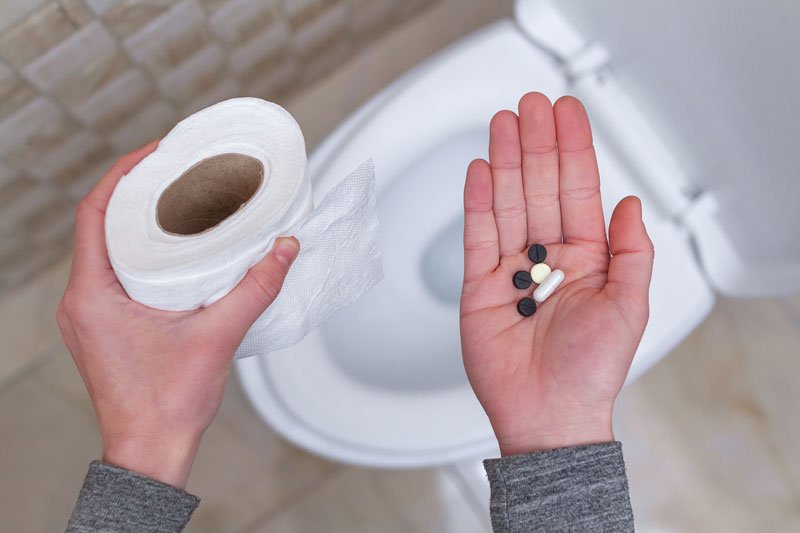Q: What’s the difference between a stool softener and a laxative?
A laxative encourages movement of the stool and assists you in eliminating feces. The word laxative means “to loosen” and is related to the word “lax” which means loose or relaxed. A laxative works to “loosen” your bowels and relieve constipation. Stool softeners are actually considered a type of laxative called emollient laxatives.
When you become constipated, it’s often because the muscles of your intestines are not moving as well as they should, slowing down the removal of your feces. The longer it takes your feces to move from your small intestine to your rectum the more water gets pulled out of it along the way, making your stool smaller, harder and more painful to eliminate. An emollient is a substance that works by softening or increasing moisture. Two types of stool softeners that work as emollient laxatives are docusate and mineral oil.
Docusate is a surfactant that acts just like a detergent or soap. Like detergents, docusate decreases the surface tension of water and helps it move water into your stool. Although docusate doesn’t directly stimulate the muscles of your intestines or the movement of stool, it can help avoid and relieve constipation by counteracting how much water your stool loses as it moves through your intestine. Docusate is usually easy to tolerate but may occasionally cause diarrhea or stomach cramps. Unlike mineral oil, it doesn’t interfere with absorption of nutrients or any vitamins.
You’ll find docusate more effective as a preventative than as a laxative because it works more slowly. You should allow 12 to 72 hours for it to work. Most of the time it will give you results within 2 days but can take up to five days for full effect. It’s often combined with a stimulating laxative for a faster effect.
The other emollient laxative is mineral oil. Mineral oil is a liquid that helps to soften the stool but doesn’t change the amount of water in it as docusate does. Mineral oil is not as safe to use as docusate because if you aspirate or inhale it by accident it can cause life-threatening irritation to your lungs called aspiration pneumonitis. Mineral oil interferes with absorption of fat-soluble vitamins like vitamin A, D, E and K, and can cause oily leakage out of the rectum. Avoid taking docusate along with mineral oil as a laxative. Docusate will help mineral oil get absorbed into your body instead of staying in your intestines, where it needs to be to work.
5 Tips for Using Docusate Successfully as a Stool Softener:
- Increase your water and fluid intake when taking docusate; this will increase its effectiveness. Because docusate works by helping move water into your stool, drinking more fluids helps it do its job better.
- If you are on a sodium-restricted diet, look for the calcium form of docusate instead of the more common sodium formulation. Docusate calcium comes as a 240mg capsule instead of 250mg, like docusate. It’s sometimes hard to find; if you don’t see the calcium form of docusate on the shelf, ask your pharmacist.
- Docusate sodium comes as liquid-filled capsules in two sizes: a 100 mg size and a much bigger 250 mg size. If you have any trouble swallowing capsules, you should select the 100 mg capsules, but because the 100 mg and the 250 mg are usually about the same price, the 250mg capsules are a better value.
- Although I have seen root beer flavored mineral oil, most mineral oil is bland tasting. Docusate is not bland. It tastes just like soap! Avoid biting or cutting docusate capsules unless you like the taste of your mother washing your mouth out with soap. The syrup is nearly as bad; it ranks consistently at the bottom of our liquid taste tests and the soapy taste can linger for hours.
- If you need a faster result, combine docusate with a more stimulating laxative like senna or bisacodyl. Senakot-S® and Peri-Colace® are examples of combination products.


